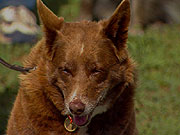Koolie
Breed: Koolie
Temperament: loyal, responsive, energetic
Lifespan: 15 years
Recommended for: active people, anyone willing to work their dog
Maintenance: low
Appearance
A Koolie is often described as looking like a cross between a rough Collie and a border Collie, although it is rangier in build. Koolies were not bred for looks but for working ability, they come in a variety of colours, which include blue and red merle, solid red, black or grey. Eyes can be blue, brown, or black. Sizes range from Kelpie size to Australian Shepherd size.
A breed standard is currently being developed – it stipulates that height should be no larger than 550mm males and 500mm for females.
History and naming
Koolies are also referred to as ‘German Koolies’, although this name should be avoided because the breed originated in Australia. Its development in Australia is associated with early German and other European immigrant farmers. There are no known Koolie breeds outside of Australia.
There is little written information about the Koolie. They are thought to have descended from the highland blue merle sheep dog. Farmers then bred the Koolie to the Smithfield breed, producing dogs with smaller legs which were able to work on cattle and sheep trucks.
It is thought that the Koolie was probably introduced to Australia by European immigrant farmers around the early 1800s, at about the same time as the Kelpie and Australian Cattledogs had their origins. According to breeder Kerrie Challenger, the Koolie breed is one of the oldest breeds of working dogs in Australia, unfortunately records were never kept regarding parentage. (In order for a breed to be officially recognised by the Australian National Kennel Control Council, stud and breed records must be kept for a minimum of seven generations.)
Attempts have been made to line breed to a standard type, but a lack of proper records and the inability to substantiate bloodlines, plus the occasional introduction of new blood have prevented official recognition of the breed.
There are a number of theories surrounding the origin of the name Koolie (variously spelt Coulie and Coolie). One theory is that the name Koolie stemmed from the derogatory term ‘Coolie’ that was used to refer to immigrant workers in Australia. Another is that it resulted from the German accent being placed upon the word ‘Collie’.
Temperament
Breeders describe Koolies as being extremely active, intelligent, anxious to please and fun-loving. They also make good watchdogs as they are not aggressive but they will bark to alert their owners. Breeders say they are good with small children.
Health and lifespan
Inherited deafness can be a problem in merle coloured breeds. The average lifespan of the Koolie is quite long, around 15 years, possibly longer.
Breeding
An average litter size is six. Merle coloured dogs, when bred together, produce a litter, of which 25 per cent will be white, deaf and blind. These pups have to be killed. This merle to merle mating must be avoided at all costs. We recommend mating merle to non-merle as this avoids the problem.
Cost and feeding
The average price for males and females is $400 -$500 for an unstarted pup/pet and upwards of $600 for a started pup/dog. Koolies cost about $9 per week to feed with a diet of dry dog food and fresh bones.
Housepet potential
Breeder Kerrie Challenger says Koolies love to be in the house and make good companions but they do need access to the outdoors.
Space and exercise
Being primarily a working dog, Koolies are suited to country life. They will run all day if required. For those keeping Koolies in urban areas, some breeders warn that Koolies have no road sense.
Ideal owner
Active people, farmers and anyone who is willing to work their dog, either on the farm or through basic obedience training. Breeders describe Koolies as thinkers, not lap dogs.
Grooming
Minimal grooming is required. Koolies do shed.
Uses and training
Koolies are excellent with stock, they can work with cattle or sheep, in yards or paddocks. Their primary use is as a working dog but they also excel at obedience, agility, tracking and endurance work. Some farmers say they are more valuable than having another man work on the property.
Breeders say the Koolie is easy to train but they do require structured training (they will not automatically know what to do at first). They respond well to gentle firm training.
Popularity
Koolies are a popular choice among farmers looking for a working dog. Koolies are not yet officially recognised as a breed by the Australian National Kennel Council.
National contacts
To find up-to-date contacts for breeders, contact the following organisations.
Dogs NSW
http://www.dogsnsw.org.au/breeders-directory
Email: [email protected]
Phone: 1300 728 022 (NSW only) or (02) 9834 3022
Fax: (02) 9834 3872
Dogs Victoria
http://www.vca.org.au
Email: [email protected]
Phone: (03) 9788 2500
Fax: (03) 9788 2599
Dogs ACT
http://www.actca.asn.au
Email: [email protected]
Phone: (02) 6241 4404 – Fax: (02) 6241 1129.
Dogs West
http://www.cawa.asn.au
Email: [email protected]
Phone: (08) 9455 1188
Fax: (08) 9455 1190
Dogs SA
http://dogssa.com.au
Phone: (08) 8349 4797
Canine Control Council of Queensland
http://www.cccq.org.au
Email: [email protected]
Phone: (07) 3252 2661
Fax: (07) 3252 3864
Tasmanian Canine Association
http://www.tasdogs.com
Email: [email protected]
Phone: (03) 6272 9443
Fax: (03) 6273 0844
Dogs NT
http://www.territorydogworld.com
Email: [email protected]
Phone: (08) 8984 3570
Fax: (08) 8984 3409



